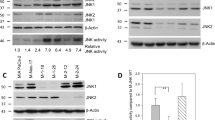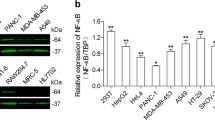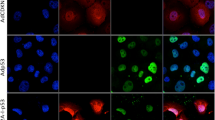Abstract
Activator protein-1 (AP-1), a transcription factor, is activated through many oncogenic signals. However, its biological role in colorectal cancer has not been fully elucidated. To investigate the role of AP-1 in colorectal cancer, we constructed an adenovirus-expressing TAM67, a dominant-negative mutant of c-Jun lacking the transactivation domain of wild c-Jun (DN-c-Jun), to inhibit endogenous AP-1. AP-1 DNA-binding activity was increased in colon cancer cells (HT-29 cells) by serum stimulation, followed by an increase in both [3H]thymidine incorporation and cell number. Transfection of Ad-DN-c-Jun to HT-29 cells significantly inhibited serum-induced cell proliferation in vitro. As shown by flow cytometric analysis, DN-c-Jun significantly inhibited entrance into S phase after serum stimulation, thereby leading to G1 arrest. In vivo transfection of Ad-DN-c-Jun into xenografted HT-29 cell tumors in nude mice significantly decreased tumor volume on day 21 after treatment. A change was associated with decrease in Ki-67 labeling index. These observations together showed that AP-1 is a critical modulator for proliferation and cell cycle of HT-29 cells. We obtained the first evidence that DN-c-Jun gene transfer exerted a significant antitumor effect on colon cancer both in vitro and in vivo. DN-c-Jun gene transfer may be a new candidate for treatment of colorectal cancer.
This is a preview of subscription content, access via your institution
Access options
Subscribe to this journal
Receive 12 print issues and online access
$259.00 per year
only $21.58 per issue
Buy this article
- Purchase on Springer Link
- Instant access to full article PDF
Prices may be subject to local taxes which are calculated during checkout









Similar content being viewed by others
References
Gryfe R et al. Molecular biology of colorectal cancer. Curr Probl Cancer 1997; 21: 233–300.
Baker SJ et al. Suppression of human colorectal carcinoma cell growth by wild-type p53. Science 1990; 249: 912–915.
Harris MP et al. Adenovirus-mediated p53 gene transfer inhibits growth of human tumor cells expressing mutant p53 protein. Cancer Gene Ther 1996; 3: 121–130.
Zwacka RM, Dunlop MG . Gene therapy for colon cancer. Hematol Oncol Clin N Am 1998; 12: 595–615.
Greco O, Dachs GU . Gene directed enzyme/prodrug therapy of cancer: historical appraisal and future prospectives. J Cell Physiol 2001; 187: 22–36.
Palmer DH, Chen MJ, Kerr DJ . Gene therapy for colorectal cancer. Br Med Bull 2002; 64: 201–225.
Fillat C, Carrio M, Cascante A, Sangro B . Suicide gene therapy mediated by the herpes simplex virus thymidine kinase gene/ganciclovir system: fifteen years of application. Curr Gene Ther 2003; 3: 13–26.
Shaulian E, Karin M . AP-1 in cell proliferation and survival. Oncogene 2001; 20: 2390–2400.
Hirano F et al. Induction of the transcription factor AP-1 in cultured human colon adenocarcinoma cells following exposure to bile acids. Carcinogenesis 1996; 17: 427–433.
Glinghammar B, Holmberg K, Rafter J . Effects of colonic lumenal components on AP-1-dependent gene transcription in cultured human colon carcinoma cells. Carcinogenesis 1999; 20: 969–976.
Guo YS, Hellmich MR, Wen XD, Townsend Jr CM . Activator protein-1 transcription factor mediates bombesin-stimulated cyclooxygenase-2 expression in intestinal epithelial cells. J Biol Chem 2001; 276: 22941–22947.
Yasumoto H et al. Dominant negative c-jun gene transfer inhibits vascular smooth muscle cell proliferation and neointimal hyperplasia in rats. Gene Ther 2001; 8: 1682–1689.
Zhan Y et al. Effects of dominant-negative c-Jun on platelet-derived growth factor-induced vascular smooth muscle cell proliferation. Arterioscler Thromb Vasc Biol 2002; 22: 82–88.
Liu Y et al. Inhibition of AP-1 transcription factor causes blockade of multiple signal transduction pathways and inhibits breast cancer growth. Oncogene 2002; 21: 7680–7689.
Miyanishi K et al. Glutathione S-transferase-pi overexpression is closely associated with K-ras mutation during human colon carcinogenesis. Gastroenterology 2001; 121: 865–874.
Angel P, Karin M . The role of Jun, Fos and the AP-1 complex in cell-proliferation and transformation. Biochim Biophys Acta 1991; 1072: 129–157.
Ochsenkuhn T et al. Colonic mucosal proliferation is related to serum deoxycholic acid levels. Cancer 1999; 85: 1664–1669.
Qiao D, Chen W, Stratagoules ED, Martinez JD . Bile acid-induced activation of activator protein-1 requires both extracellular signal-regulated kinase and protein kinase C signaling. J Biol Chem 2000; 275: 15090–15098.
Milovic V et al. Deoxycholic acid stimulates migration in colon cancer cells. Eur J Gastroenterol Hepatol 2001; 13: 945–949.
Licato LL et al. In vivo activation of mitogen-activated protein kinases in rat intestinal neoplasia. Gastroenterology 1997; 113: 1589–1598.
Mandal M et al. Butyric acid induces apoptosis by up-regulating Bax expression via stimulation of the c-Jun N-terminal kinase/activation protein-1 pathway in human colon cancer cells. Gastroenterology 2001; 120: 71–78.
Yao KS, Xanthoudakis S, Curran T, O'Dwyer PJ . Activation of AP-1 and of a nuclear redox factor, Ref-1, in the response of HT29 colon cancer cells to hypoxia. Mol Cell Biol 1994; 14: 5997–6003.
Shaulian E et al. The mammalian UV response: c-Jun induction is required for exit from p53-imposed growth arrest. Cell 2000; 103: 897–907.
Schreiber M et al. Control of cell cycle progression by c-Jun is p53 dependent. Genes Dev 1999; 13: 607–619.
Smith MJ, Prochownik EV . Inhibition of c-jun causes reversible proliferative arrest and withdrawal from the cell cycle. Blood 1992; 79: 2107–2115.
Yang Y, Su Q, Wilson JM . Role of viral antigens in destructive cellular immune responses to adenovirus vector-transduced cells in mouse lungs. J Virol 1996; 70: 7209–7212.
Lusky M et al. In vitro and in vivo biology of recombinant adenovirus vectors with E1, E1/E2A, or E1/E4 deleted. J Virol 1998; 72: 2022–2032.
Magrisso IJ et al. Immunohistochemical detection of RAS, JUN, FOS, and p53 oncoprotein expression in human colorectal adenomas and carcinomas. Lab Invest 1993; 69: 674–681.
Brown PH, Chen TK, Birrer MJ . Mechanism of action of a dominant-negative mutant of c-Jun. Oncogene 1994; 9: 791–799.
Kanegae Y et al. Efficient gene activation in mammalian cells by using recombinant adenovirus expressing site-specific Cre recombinase. Nucleic Acids Res 1995; 23: 3816–3821.
Kim S et al. Angiotensin blockade inhibits activation of mitogen-activated protein kinases in rat balloon-injured artery. Circulation 1998; 97: 1731–1737.
Yano M et al. Differential activation of cardiac c-jun amino-terminal kinase and extracellular signal-regulated kinase in angiotensin II-mediated hypertension. Circ Res 1998; 83: 752–760.
Author information
Authors and Affiliations
Rights and permissions
About this article
Cite this article
Suto, R., Tominaga, K., Mizuguchi, H. et al. Dominant-negative mutant of c-Jun gene transfer: a novel therapeutic strategy for colorectal cancer. Gene Ther 11, 187–193 (2004). https://doi.org/10.1038/sj.gt.3302158
Received:
Accepted:
Published:
Issue Date:
DOI: https://doi.org/10.1038/sj.gt.3302158
Keywords
This article is cited by
-
Chloroquine inhibits human CD4+ T-cell activation by AP-1 signaling modulation
Scientific Reports (2017)
-
CDK5 functions as a tumor promoter in human colorectal cancer via modulating the ERK5–AP-1 axis
Cell Death & Disease (2016)
-
JNK: A Stress-Activated Protein Kinase Therapeutic Strategies and Involvement in Alzheimer’s and Various Neurodegenerative Abnormalities
Journal of Molecular Neuroscience (2011)
-
Emerging roles of ATF2 and the dynamic AP1 network in cancer
Nature Reviews Cancer (2010)
-
Clinicopathological significance of expression of p-c-Jun, TCF4 and beta-Catenin in colorectal tumors
BMC Cancer (2008)



